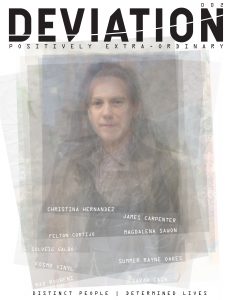Devon Rodriguez: Keeps it Real
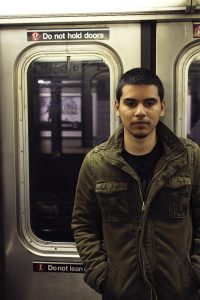
Photo by Kreg Franco
By Ash Hoden
Devon Rodriguez is fresh from a studio visit when we sit for our talk. The twenty-year-old painter has been getting much attention these days. It’s been building, the way a snowball grows in mass and speed as it careens down a mountain. One thing led to this which led to that which triggered another thing over there, and on and on in a chain reaction of positive reinforcement for one overriding message: keep doing what you’re doing. Barely out of his teens, he has already confronted the single most difficult question most artists must face: how do I support myself through art? Painting is Devon’s ticket out, but it will be no cakewalk.
This studio visit is the direct result of Devon recently being featured in The New Yorker, which is the direct result of John Ahearn selecting him to be a subject for a series of live plaster castings, which is the direct result of Devon’s work being shown at the BronxArtSpace where he was an intern at the age of eighteen, a job he landed through his attendance at the High School of Art and Design, which he was accepted into with the assistance of Jeremy Harper, his Freshman-year art teacher at Samuel Gompers High School — a troubled school that has since been closed. As Devon would say, it’s all connected.
“I just had this studio visit from these people that read that article,” the one in The New Yorker. “They’re like, ‘Oh, I want to come have this official studio visit because I’m a collector, and stuff.’ I’m like, ‘Oh my god, I’m painting at…’” This leads to a sidebar about his living situation. Recently he had been staying in Brooklyn with a writer named Diane, a woman who generously offered him free accommodation so that he could focus on painting. Due to some confusion between her and the landlord Devon temporarily returned to his grandmother’s place in South Bronx, living there with several cousins. “They’re like, ‘I want to have an official studio visit with you.’ And I’m thinking, ‘I don’t have a studio, this is just my grandmother’s living room.” (I’m laughing as I listen.) “But they were fine. They were like, ‘Oh, that’s fascinating.’ Yes! I’m glad they think it’s fascinating and not that it’s very “low-end” of me. It went fine. I was just… Some of my cousins would like come out of the room and stuff. And some of ‘em like to make fun of me because they say that I speak white when I talk to like…” (Now I’m cracking up.)
Devon is really funny, in an over-analytical Woody Allen sort of way. When he tells a story he begins at one point, stops midway through the sentence, jumps over to a detail he has forgotten that will be important later in the tale, then goes back to where he started and takes it from the top. Almost every story goes by this formula. There are a lot of half-sentences and back and forth, should I? or should I not? types of uncertainties included as well. Usually it results in a hilariously self-deprecating conclusion that reveals the contrast between himself — the quiet, thoughtful, sensitive painter guy — and the harsh surroundings he grew up in. He sees the absurdity of it all too clearly, and just beneath the surface of his soft voice is the sound of laughter. It adds to the humor of his stories.
When I laugh about his cousins teasing him for talking like a white guy he attempts to explain. “I’m like, ‘You have to sound…’ Yeah, they make fun of me for it but I’m like, ‘You have to.’ Actually, I’m not even trying. Like, you have to. You can’t… I don’t know.”
It’s true. You have to talk the way you’re going to be received, you know.
“They’re like, ‘You’re so fake.’ I’m like, ‘I have to be.’ And I’m not actually. It’s because… Like, Diane always says that I’m weird because I don’t like to mix my worlds. I don’t like to introduce her to my family. It’s because, growing up with them I have to be kind of like harder because then they’ll talk about you. And with other people, when I’m myself… I just can’t mix it because then… I don’t know.”
The worlds are too different to see how it would work together? Is that kind of how it is?
“Yeah. I guess.”
At the age of twelve Devon was placed with his grandmother by the Administration for Children’s Services (ACS). His father had long been out of the picture, but Devon knew his reputation. “My dad was a super-talented tattoo artist but he left when I was two-years-old. All these people from the neighborhood used to tell me, ‘Oh, your dad was amazing. He did this tattoo, he did that…’”
People would show you his work?
“Yeah. Still. Some guy just showed me at the barber shop something my dad did. And I’m like, ‘Oh my god, people are giving him so much credit and attention. How come he’s not here? I want to be an artist. How come he’s not teaching me?’”
You don’t know where he is or what happened?
“That’s an insane story! So, I always wanted to know him because he was an artist and I was always interested in drawing. And I looked for him on Myspace and I couldn’t find him. Because his name was Carlos Rodriguez and there’s like a million of those names out there. And then on Facebook, I asked my aunt, ‘Do you know if he has a nickname or something?’ She’s like, ‘Oh, I think they called him Cilo in the tattoo world.’ So I searched up Cilo Rodriguez. And I’m going through the pages and on the fourth page I found Cilo Rodriguez with a profile photo that has a tattoo on it — this Hannya mask. It’s a Japanese demon that he used to do. And I’m like, ‘Oh, this must be him.’ But then the last status he posted was like two years before that time. So I’m like, ‘He’s never gonna read this message.’ So I messaged all his friends. I copy and pasted this big message, ‘I’m his son. I’m looking for him.’ And my dad had like twenty kids. Not everyone knew about that, but he has like twenty kids. People were like, ‘He has a son?’ They didn’t even know he had one son.”
No way.
“Yeah. So then they told me, ‘Oh, he works at this shop in Miami.’ And I called the place. He’s like, ‘How did you find me?’ Because he’s been hiding from child support for like twenty years, and nobody could find him. He’s like, ‘Everyone’s been looking for me. Nobody could find me. How the hell did you even do it?’ And I told him how. He’s like, ‘Well, yeah, I looked through your images and I like your work. You’re talented. Wow. I’m proud of you. Come to Miami. We could like hang out. I’ll teach you how to tattoo.’ So last year I go to Miami, and, um… Oh my god, it was insane. It was insane! My dad was super rough… He was like a thug. We didn’t connect on the same level, because he was like… He had tattoos on his face and tattoos on his hands. I mean I guess that could be an artsy thing, but he was thuggish. So, I was looking for him all my life right, and he ended up saying that I was like too soft and pussy, and that I was acting white. ‘Cause he’s from the Bronx and used to sell drugs too. He ended up kicking me out. After I was there for a month right. He’s like, ‘Get out of my house! You’re acting like too much of a bitch.’ Like, me living with a thug from the streets. It was crazy. Even though he was my father. But he did have this soft side and he did like to draw and stuff. But still, for the most part he was a thug. I came back to New York and I’m like, ‘I wanted to connect to my dad all these years and this is how he was?’ So I called him. And I’m like, ‘Yo, can I come back? Can I make things right?’ He’s like, ‘Alright. I feel bad for how shit went down. You can come back.’ So I came back like a month later. He was so insane. He had to go into the hospital because he kept vomiting and stuff. And one day he just… So one time he told me that he hated when — in the tattoo shops when he had a paper towel roll — when random clients would just unroll his paper towels and use them. He’s like, ‘I hate when people waste my paper towels like that!’ He said that one day. So when he went to the hospital he cut the IV — you know how you have an IV needle and there’s a wire? He cut the wire and just left the hospital, right. So when he got home he just had a wire and the needle inside. And he like pulled out… He’s like, ‘Fuck this!’ and pulled up the needle and there was blood squirting. I’ve never seen anything like it. So I grabbed the paper towels, and I unrolled it. He’s like, ‘You fucking idiot asshole! Why would you waste my paper towels like that! You know I hate that!’ And I’m like, ‘Oh my god! You’re squirting blood.’ He’s like, ‘You think I give a fuck!’ Anyway, a week later I found him dead in the kitchen. And I didn’t even know he was sick. From alcoholism. From cirrhosis, ‘cause his liver was—”
Dammmn!
“And out of all the kids and out of all the times, like, what are the chances that I find him at this time and we finally meet? It was just insane. And then I called the cops and they were asking me like, ‘What’s his date of birth?’ and all this stuff that I didn’t even know, even though it was my dad. I didn’t know what to think. It was so weird to see a dead body and I knew it was my dad but then also it was a stranger. Like even though it was my dad, I didn’t really know him. So I didn’t know what to feel.”
That’s wild, man. He was more worried about the paper towels than bleeding?
“Yeah, he was more worried about the paper towels than himself. I didn’t even know how to deal with a person like this.”
Are you glad you found him?
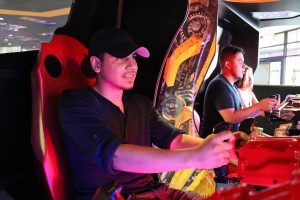
Photo by Kreg Franco
“I’m glad I met him before he died and I [would have continued thinking], ‘Damn, what would it have been if I would have met him?’ So, yeah I’m glad I met him. And I’m glad he didn’t raise me, because if I was raised by that guy I think I would be different.”
Knowing that maybe answers some questions from when you were younger. Like, you got answers out of meeting him, regardless of whether it’s how you wanted it to be.
“And I’m also happy that he wasn’t there. Like you hear about all these rappers and other successful people that come from the bottom and it motivates them to work hard. I went to F.I.T. (Fashion Institute of Technology) for a couple semesters and those kids did not work hard at all. They already had it made at home. I feel like, because of that it didn’t motivate them. I feel like everything is connected, you know.”
In middle school Devon started with graffiti. That was his outlet, and he imagined that it would get him into the High School of Art and Design. “I was so cocky about my art. I was like, ‘I’m a beast. I could just go tag this spot at three in the morning and I could do this whole wall without getting caught. I could do all this. I’m so good at art.’ Even though I was just doing graffiti tags. I just thought that I was gonna get into Art and Design. I had to do a portfolio of ten to fifteen pieces. And I left it for last minute. All summer I was just hanging around. I’m like, ‘I could just do it the day before. Ten pieces that’s so easy. I can do ten pieces in a day.’” Needless to say, he wasn’t selected that year. He went to Samuel Gompers instead.
“I had an art teacher there. He was really good at drawing and teaching how to draw. So I told him I didn’t get accepted, and he’s like, ‘Show me your portfolio. Of course you didn’t get accepted. This is a black book. This isn’t a portfolio. All you have is graffiti tags and graffiti characters. You need to be more diverse and have fundamentals of drawing, still life, all this stuff.’ He’s like, ‘This year we’re going to do fifteen projects that will take time. I’ll show you how I did it and I got accepted into SVA (School of Visual Art).’ So within that year this teacher helped me. I applied again for the second year, so I got in for sophomore year at Art and Design.”
So it really helped to have guidance from a teacher?
“If I didn’t have him I don’t know where I would have been. When I got into Art and Design that’s where I met my painting teacher that taught me everything. He had this banner above his door that said AP Art. And I’m like, ‘All the other art classes didn’t have it. This class must be special. Let me go inside and look at this.’ And he was there painting one of his students. It was him mixing colors and painting, and the model was right there, and it was the same thing. I saw him do it and I’m like, ‘How does he? Oh my god this is insane.’ So I told him, ‘Can I be in this class?’ And he’s like, ‘Oh, you have to be a junior or senior. But let me write your name for the waiting list and you give me your portfolio.’”
What did you have in your portfolio?
“By then I already learned from the first teacher. And I had that whole summer, so I went to the Art Students League because my first teacher told me about that. He made the Art Students League sound like it was where all the gods came from. So I’m like, ‘I’ve got to go there before I get into Art and Design because those kids are real artists. Those are like art school kids. I’ve got to practice in the summer before I get there, before they make fun of me or something. I was drawing all summer so I had a sketchbook to show him and he was like, ‘Oh you’re good. Just wait ’til next year and you’ll get in.’”
How was the Art Students League?
“At the time I’d never seen anyone render something so realistically. Like, to see a bottle and be able to draw it so accurately. That was like magic to me, and I thought that was the highest level of art. Now, I feel like that school is a bit too traditional for me. I’m trying to open up, to not only focus on being technical. Like Tim [Okamura]. Tim is really good at painting, but he has great concepts too. And he’s not doing photorealism. You can see, he uses super-thick paint. So I’m trying to be more open [than] the Art Students League crowd. But when I got there it was just so amazing to see people, like, paint a nude from life exactly how she was and get every shade and color right. I just loved it. I was around all these old people — only old people go there now. And I’m like a kid around all these old people. I was just happy to be there. Everyone is dirty and drinking coffee and like weird artists, and I thought it was super-cool.”
So in the art high school it was a whole different crowd than what you had seen?
“Yeah, when I first got there, I was like, ‘Oh my god. Why are these people sitting on the floor? They don’t know that the floor is dirty?’ Because people don’t sit on the sidewalks in the Bronx. And they were just like reading books. They were these artsy kids. Blue hair and piercings and… White kids. I never went to school with white kids. It was just so weird. It was just different.”
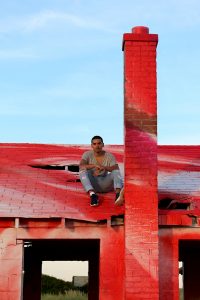
Photo by Kreg Franco
Did you feel comfortable, like it was more of your crowd?
“Well, at the time it wasn’t. I had this star tattoo right. And I had it since I was thirteen — it’s crazy that I got it when I was thirteen. So when I got there people used to look at me… Everyone thought I was a thug because I had this tattoo at fourteen-years-old. Even though I really wasn’t. But um… No, I didn’t really have many friends the first year, because I thought everyone was weird and I felt like they weren’t cool enough for my crowd. But when I started to see that… I don’t know, I just started becoming more like them, so yeah, I ended up finding my crowd the second year. Just from being interested in art, you know. You can be different and be interested in the same thing. When I was younger I used to like to take walks around the neighborhood and just think and listen to music. They used to make fun of me right, and I used to never tell anyone. So when I got to art school, I would tell some people, ‘Oh, I like to take walks.’ I just always thought that people would think that I was super-weird for that, but, I don’t know. Everyone accepted me.”
Seeing that, did it help you to open up to the crowd a bit?
“I thought everything was weird. People used to… I know this sounds crazy, but, people used to ask their friends, ‘Oh, do you have food on you?’ And they would be like, ‘Oh, yeah, I have an apple. Here’s an apple.’ And I used to always think, ‘What? Who eats apples?’ I was just… It was so different. At the time it was so different.”
Devon went on to study at the Fashion Institute of Technology for a couple of semesters after graduation. But by that time he was already selling paintings through a gallery in Colorado and he found the first year curriculum at F.I.T. to be a repetition of what he had already learned. He decided not to continue with college. “I thought, ‘If I’m doing this for this gallery as a real artist, why would I stay there?’ But I don’t know, maybe I should have stayed. Some people say you don’t need a degree in art. Like you could just have the quality of your work show what you do. Some people say you need the MFA in order to get a museum show one day. Or you need it just to be safe. You could always land a teaching job if you don’t want to just live on paintings. But I don’t know.”
So you felt that getting the degree is just having the piece of paper?
“Yeah, that’s what I thought. Isn’t the goal to get into a gallery? Isn’t the piece of paper just a byproduct, but the real goal is to show your work? And if I’m already doing it… But maybe I was just being ignorant. I don’t know. My painting teacher that I first met in high school, he still emails me all the time. ‘I’m worried about you. Go back to school.’ He’s like, ‘Devon, I know you have big dreams. You could be hot one year and then the next year… The art world is not steady. You need a paycheck.’ I guess he’s right. But I don’t really know.”
You’re hitting the big dilemma that I think every artist has to deal with.
“Because I feel like, I want to make it, and I should believe in myself and I could make it on my own. But then at the same, I want to be steady and get a paycheck. But then, in these self-help books it’s like, ‘Don’t just follow the status quo. Those people are all the same. You gotta do what other people don’t do if you want to be where other people aren’t.’ It’s just all these messages from different people. I hardly know where I should commit. But I dropped out and I’m painting now. And this article came out and I’ve gotten some attention from it. But I don’t know, he’s always telling me, ‘Just because this and that doesn’t mean anything.’”
Weeks before he and I spoke, one of Devon’s Instagram posts caught my eye. It was a psychiatric evaluation that had been performed by the ACS program when they placed him with his grandmother. It said that “he has dreams of being an artist.” I ask him about it.
“Oh my god! I got so much shit for that.”
Did you?!
“I ended up deleting it because people kept messaging me, ‘This is the stupidest thing you could do! Why would you post that! That’s stupid. It’s too personal.’ And all this shit. But the reason I posted it was because, it said…” He stops and goes into the backstory of having to do a mandatory evaluation for the ACS program when he was placed in his grandmother’s care. “So that was the evaluation and my grandmother gave it to me three weeks ago. She’s like, ‘Oh, look what I found.’ I had never seen the evaluation. I just knew I was in it but I didn’t see — like, that was the therapists notes. And I looked through it and it said, ‘The patient is in eighth grade, he’s doing well, he has dreams of being an artist.’ And at the time I was nowhere near what I’m doing now. I’m like, ‘This is seven years ago and it’s coming true! It’s like I spoke it into existence. At the time I was nothing. Let me show this on Instagram now that I have some followers. Let me show them.’”
I thought it was great. The thing about how “he has dreams of being an artist,” I thought that was awesome.
“Right, I thought it was interesting. Even though it’s probably weird to say it about myself — that it was interesting. But if I would have seen somebody else post that, I would have been like, ‘Oh shit, that’s cool.’ It’s real. It was from seven years ago and I found it and I wanted to share it.”
I thought it was great man. I could see somebody — like somebody from an institutional context — hearing an eighth-grader say, ‘I want to be an artist’ and think, ‘Good luck with that, kid.’ But you were declaring it, you know. It’s cool.
“At the bottom it said, ‘Child goes through physical abuse at home.’ I guess that part was going too far. Maybe they didn’t like that part. But nobody knows that. I forgot about it. I didn’t even tell some of my friends.” Devon didn’t realize that the report also showed his Global Assessment of Functioning score. He had accidentally advertised the state’s assessment of his ability to function socially and in school. People gave him a hard time for posting that too.
“I guess I just wanted to show people that you could still make it, or something. I don’t know. I’m not making it, but one day.”
It seems like it’s going pretty well. I mean, you’re pretty together. It seems like you came through that without being too affected.
“Um. Sometimes I make some stupid impulsive decisions. I think that maybe comes from that, I don’t know. So my dad… Oh, this is another crazy thing about my dad. When I went there he gave me his last tattoo, out of twenty-four years. He gave me a tattoo on my arm. And he was supposed to give me sleeves, because I always wanted tattoo sleeves. It would be cool to go around and say, ‘My dad did this.’ But then he ended up dying so we couldn’t finish the sleeves. He only did one. So I ended up going to this guy that did the star, even though I’d seen… I ended up getting a tattoo here, here, here, and here. And then I ended up regretting it like a month later.”
All of them?
“All of them. A month later. Which is insane!” (I’m laughing again.) “It’s so insane. Like why would I get four tattoos and then regret it a month later? So then I ended up getting this tattoo internship because, I was like, ‘Maybe people are right? Maybe painting isn’t so steady? And maybe I should get something more steady? But I still want it to be art related.’ I already had my dad’s connections by then. People knew that I was his son. This is the shop in Brooklyn. In Greenpoint. And the boss there is really cool with my dad. I walked in there and I told him, ‘I want to intern here so I can learn how to tattoo. My dad is Cilo.’ They were all amazed, like, ‘Oh shit! You’re Cilo’s son!? You look just like him. Oh my god! Yeah, you could learn how to tattoo here.’ So I was learning how to tattoo there for like three or four months. That boss was like, ‘Oh, let me give you sleeves. You’re my apprentice and that’s usually how it goes.’ And he was really good at Japanese tattooing. So I told him, ‘No I gotta get these removed one day first, because I hate these tattoos.’ And he’s like, ‘Oh, I know this lady that’ll do it for free for you because she’s one of my best friends.’ So I did like three sessions with her, but I ended up leaving the tattoo shop and I didn’t want to use his connection anymore because I felt like that was kinda — even though I gave her a painting because I didn’t want to freeload — but I just felt like I shouldn’t use that connection anymore. So I got three sessions of tattoo removal on each of them, like four months after I got them, and um… So yeah I’m put together for the most part but then things like that.” (I’m cracking up again.) “Now I’m walking around with like half-removed tattoos that look disgusting.” (Totally cracking up.) “So like this is why I have quarter-sleeves on right now because of the studio visit and I hate showing them. It just makes me look like… Like I’m… Not well put together.”
That’s a really good story.
“I can’t believe I got them and then regretted them and then got them removed three months later.”
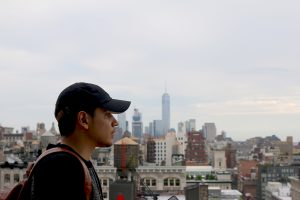
Photo by Kreg Franco
Partially removed. What was it that made you decide that you didn’t want to do tattoo?
“Because my heart wasn’t really into it and I just wanted to do it for money — they make like 200 dollars an hour. Because with my family they always have arguments with eviction problems and all this crazy shit. So I’m like, ‘I can’t be poor when I grow up. I don’t want to be in the same problems they are. So I was doing that just for money. And then the shop I was at, it was all traditional tattoos, which are cool, but I wanted to do realism tattoos. I guess if I went back I would go to a tattoo shop that does realism. That place was more traditional and my heart wasn’t into that. Like, they would make fun of me because I wanted to do realism. They’re like, ‘That tattoo doesn’t have any outlines. A tattoo must have outlines.”
How did you meet John Ahearn?
“My painting teacher, the AP one, he’s like, ‘Devon, you live in the South Bronx right? There’s this internship open for a gallery there.’ I ended up working there, and I was begging the director to give me a show. She’s like, ‘Nah, you’re only seventeen. We only show professional artists.’ But she’s never seen my work. And then I invited her to my high school senior art show. And she’s like, ‘Your work is cool. We could do a four-person show for only a weekend. And I would send it out to my mailing list.’ John has a studio down the block from there too. He saw that it was a portrait show and he loves portraits so he had to come, he said. And then he liked one of my paintings. He was always fascinated with people from the Bronx. Like his whole career is sculpting people from the Bronx.”
It’s a lot of good fortune.
“Yeah, I don’t know how things come around and connect and stuff. It just happens. It’s so weird.”
I think a lot of it is being open to it as well. You were asking her for a show, you were pushing, you know. And then she sees your work and then there’s a show. And then from that you meet these other people, and then—
“Yeah I think it’s because it’s always on my mind. It’s all I think about. Have you ever heard of the Law of Attraction?”
I have yeah.
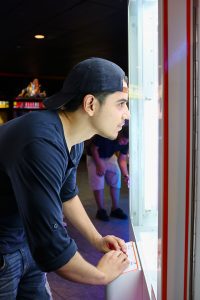
Photo by Kreg Franco
“Well I didn’t know about it until I saw this documentary on it. And it’s like, the more you think about something the more it attracts to your life. So I’m like, ‘Oh maybe that’s why good luck happens because I’m always thinking about, ‘How am I going to be successful? Maybe it’s a bad way to think, because people are always like, ‘What else do you do? Do you hang out? Is that all you do?’”
Do you do other stuff outside of painting?
“Yeah, I hang out with my friends and stuff. But not as much as other kids. To the average twenty-year-old, all I do is paint. But I still like to hang out sometimes. I just don’t party unless somebody invites me, but not that often.”
What about dating?
“Oh that’s another thing. Oh my god. People think I’m so weird. Maybe I am. Like, no. Something’s wrong with me. I don’t know. No, I don’t even date that much. This is why my dad and other people from my family like to call me gay. But I’m not.” This is one of those moments where the laughter is just beneath the surface of his voice. He fully recognizes that there’s humor in the contrast between himself and his surroundings. “I like girls but I just don’t think about it because I’m always painting. Maybe I am weird. But no, I don’t date that much because I don’t have time. Maybe I do have time if I made time for it. But dating costs money and time, so I have to put that into it. But I think it’s because I’m not open to it. Who knows?”
Growing up in rough circumstances can be divisive — either corrupting or purifying one’s spirit. There is very little question as to which direction Devon went.
Get Deviation Issue 002 (Print or Digital)
[fbcomments width="100%" num="10" ]

